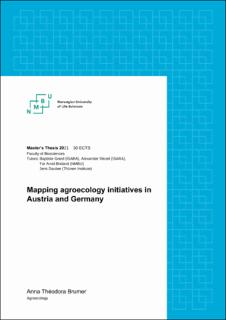| dc.description.abstract | Transforming food systems is necessary to address the global issues of severe biodiversity loss, hunger and malnutrition, as well as the consequences of the rapidly advancing climate change. Agroecology as a systemic approach attempts to implement its worldview in practice. It has been recognised as a promising path of change. In order to strengthen this transformation efforts to map agroecology endeavours are ongoing. The aim of this study was to get an overview of the advancement in agroecology and collect information on existing initiatives in Austria and Germany.
In this study, 21 interviews were conducted to determine the recognition, understanding and development of agroecology in Austria and Germany in terms of movement, practice, policies and research. This was followed by interviews of initiatives following agroecological principles to illustrate what is already being done. Data was analysed and categorised in five pillars of agroecology: Movement, Practice, Living Lab, Science and Research Infrastructure, and Training and Education.
According to our results, the term of agroecology is not commonly used in Austria and Germany where the concept is mainly associated to a scientific discipline. Agroecological practices are implemented primarily through organic agriculture, which is very developed in Austria and to a lesser extent in Germany. Many networks, food councils, associations, and scientific projects exist. Each with specific purposes and ambitions to change farming and food systems. While most selected initiatives do not explicitly refer to agroecology, all follow agroecological principles and certainly play a key role in accelerating the transition.
Clarifying the concept of agroecology, overcoming economic and political barriers as well as fostering participation of a multitude of stakeholders in the transition will give key insights for the future development of agroecology in Austria and Germany. | en_US |

